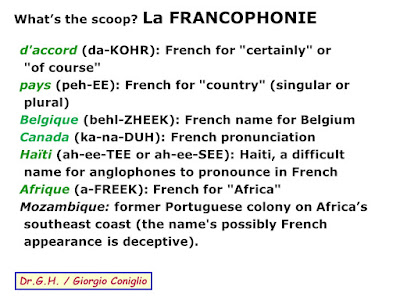Since 2016 Giorgio Coniglio, registered pseudonym and editor-in-chief, has been bundling collections of POETRY, WORDPLAY and PHOTOGRAPHY, seasoned with humour and parody, with the sole aim of entertaining YOU with presentations at the rate of 5 times per month. The related blog "DAILY ILLUSTRATED NONSENSE" sends out items from these collections in somewhat random order one-at-a-time.
Wednesday, 25 March 2020
Friday, 20 March 2020
Political palindromes, H - J
For BACKWARD, return to the previous set (E to G),
Sunday, 15 March 2020
VERS FRANÇAIS: Verses about SAVOIR-FAIRE
PARODY COMPOSED: Giorgio Coniglio (registered pseudonym) and Dr. GH, December 2018. Today's verses have been web-published at OEDILF.com, an online humour dictionary that has accumulated 102,000 carefully edited limericks.
SONGLINK: For those readers who like poetry set to music: On our sister blog "SILLY SONGS and SATIRE", you can find various singable versions of limerick medleys, including a collection of verses about French set to a novel tune.
By the way, to find more limericks, or any other search target on either of these 2 blogs, use the SEARCH-FUNCTION found at the top of the right-hand margin.
Authors' Note:
à propos: in regard
outré: inappropriately eccentric in behaviour or appearance, or exceeding the limits of propriety
sans doute (sahn DOOT): certainly, without doubt
paraph (PA-ruhf): confirmatory mark after a signature, derived more remotely from the French term paraphe
nonpareil: a paragon, one who has no equal
Although the word nonpareil has been used in English, often pronounced as non-pah-REHL, since the 16th century, one must adopt the snobbier French pronunciation (non-pah-RAY) for the verse to rhyme.
Despite its status as a longstanding valuable English descriptor, unique retains a Gallic sound, which is frankly ... unique.
Bilingual labelling can produce startling results. In Canada, pomegranates and their juice must be imported. But, in French-speaking parts of the country, we would refer to them as grenades, the modern French term for the fruit. In the circumstance under discussion, the particular juice-box was labelled on its French side as grenade.
An archaic term, pomegranate derives from the Middle Ages, but seems to have gotten stuck in English as a sort of borrowed anachronism.
An archaic term for the tree and for the fruit, pomegranate derives from the Middle Ages, but seems to have gotten stuck in English as a sort of borrowed anachronism. On the other hand, we have grenadine syrup, a cocktail additive, putatively made from pomegranate juice, but in fact, often concocted from synthetic ingredients.
Tuesday, 10 March 2020
Praising the CHARLESTON GARDEN
SATIRE COMPOSED: Giorgio Coniglio (registered pseudonym) and Dr. GH, 2018. Today's offering has been inspired by Mother Nature's wonderful displays, aided by ingenious garden designers who took advantage of the favorable climate in coastal South Carolina. The author has had the good fortune to be able to serve as a docent for the March 'Glorious Garden' Tours organized by the Historic Charleston Society.
Today's verses have all been through the extensive editing process at the cooperative poetry and humor site OEDILF.com (the Omnificent English Dictionary in Limerick Form). The illustrating photographs, unless otherwise indicated were obtained on GC's iphone 7, and processed using Powerpoint software.
Thursday, 5 March 2020
Poetic Parody: "AS WE NUKE IT"
POETIC PARODY (reprinted)






































